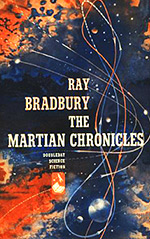
![]() Scott Laz
Scott Laz
12/16/2011
![]()
It was fascinating to return to The Martian Chronicles over three decades after first reading it. (Bradbury was the first SF writer I read as a child.) It remains beautiful, relevant, and unique.
Bradbury, in a series of linked short stories, presents the history of the exploration of Mars and the subsequent emigration and abandonment of the planet by humanity. The stories include rockets, robots, and Martians, but Bradbury clearly has no interest in scientific extrapolation regarding these SF tropes. Instead, they are used as plot device or metaphor to get at his real concerns about the state of humanity (Americans, especially), at the time he wrote these stories. In fact, if you think too much about the literal events of the book, it won't work for you. The first Mars expeditions made up in part of yahoos who get drunk and vandalize ancient Martian artifacts? Thousands of people colonizing Mars within a couple of years of the earliest explorers reaching it, bringing with them all the trappings of life on Earth? Almost the entire human population of Mars returning en masse after seeing their home planet on fire as the result of a nuclear war?
Yet these events seem almost foreordained in the context of Bradbury's themes, which include cultural and racial intolerance, imperialism, humanity's propensity for violence, the consequences of ignorance, the repression of individuality, and the inability of people to learn from history. Yes, it's a laundry list of cold war alienation, but the issues take on added relevance and added interest in the SF context. It seems that, for Bradbury, technology merely gives humanity's unfortunate tendencies new venues in which and tools with which to manifest themselves. The arrival of humanity spreads Earth's (actually, America's) culture to Mars, wiping out the Martians in the process through the spread of disease--a point reminiscent of what happened to the Native Americans. Book censors and hot dog stands are not far behind...
The telepathic Martians take on different roles in different stories, serving mainly as metaphor rather than character. They serve alternately as victim, nightmare, conscience, oracle, empath, and mirror. They are projections of us and, at the end of the book, we must become them, if there is to be a future for humanity.
Not every story is up to the level of the half-dozen classics in the book, but each does make a contribution to the theme. The format allows Bradbury to make use of his forte--the emotional punch of the short story--while building theme and resonance as in a novel. When I began rereading, I suspected that The Martian Chronicles might not be as good as I remembered, but I think it may be even better, though in ways I probably didn't see back in the '70s. Other Bradbury short stories from the late '40s and '50s reach the same heights as those in this book, but the added resonance of the links between them makes this the essential Ray Bradbury book. An enduring contribution to SF and to American literature!